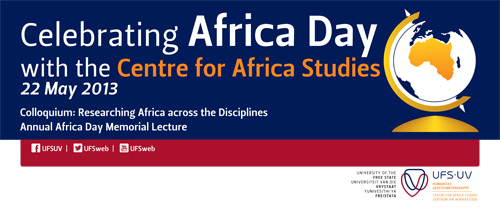14 May 2013

Programme (Pdf)
 The University of the Free State will celebrate the 50th anniversary of Africa Day, focusing in depth on issues affecting the continent. Academics from across disciplines will take part in a colloquium on the Bloemfontein Campus on 22 May 2013 discussing issues that influence the development and history of the continent, the challenges it faces, and the opportunities that lie ahead.
The University of the Free State will celebrate the 50th anniversary of Africa Day, focusing in depth on issues affecting the continent. Academics from across disciplines will take part in a colloquium on the Bloemfontein Campus on 22 May 2013 discussing issues that influence the development and history of the continent, the challenges it faces, and the opportunities that lie ahead.
Hosted by the Centre for Africa Studies, celebrations will culminate with the annual Africa Day Memorial lecture to be presented by Prof Henning Melber, who will be inaugurated as an extraordinary professor at the centre. Prof Melber will speak on "Africa and Africa(n) Studies: confronting the (mystifying) power of ideology and identity".
Africa Day marks the founding of the Organisation of African Unity (OAU) on 25 May 1963. The OAU underwent a name change in July 2002 to become the African Union (AU), but the day is still commemorated to symbolise Africa’s independence from foreign political control and affirms Africa’s quest for durable peace and unity.
The Africa Day Memorial lecture and colloquium will be hosted in the CR Swart Auditorium. Registration for the colloquium takes place from 08:00 until 16:00. The Memorial Lecture begins at 18:00.
Short Biography: Prof Henning Melber (Pdf)